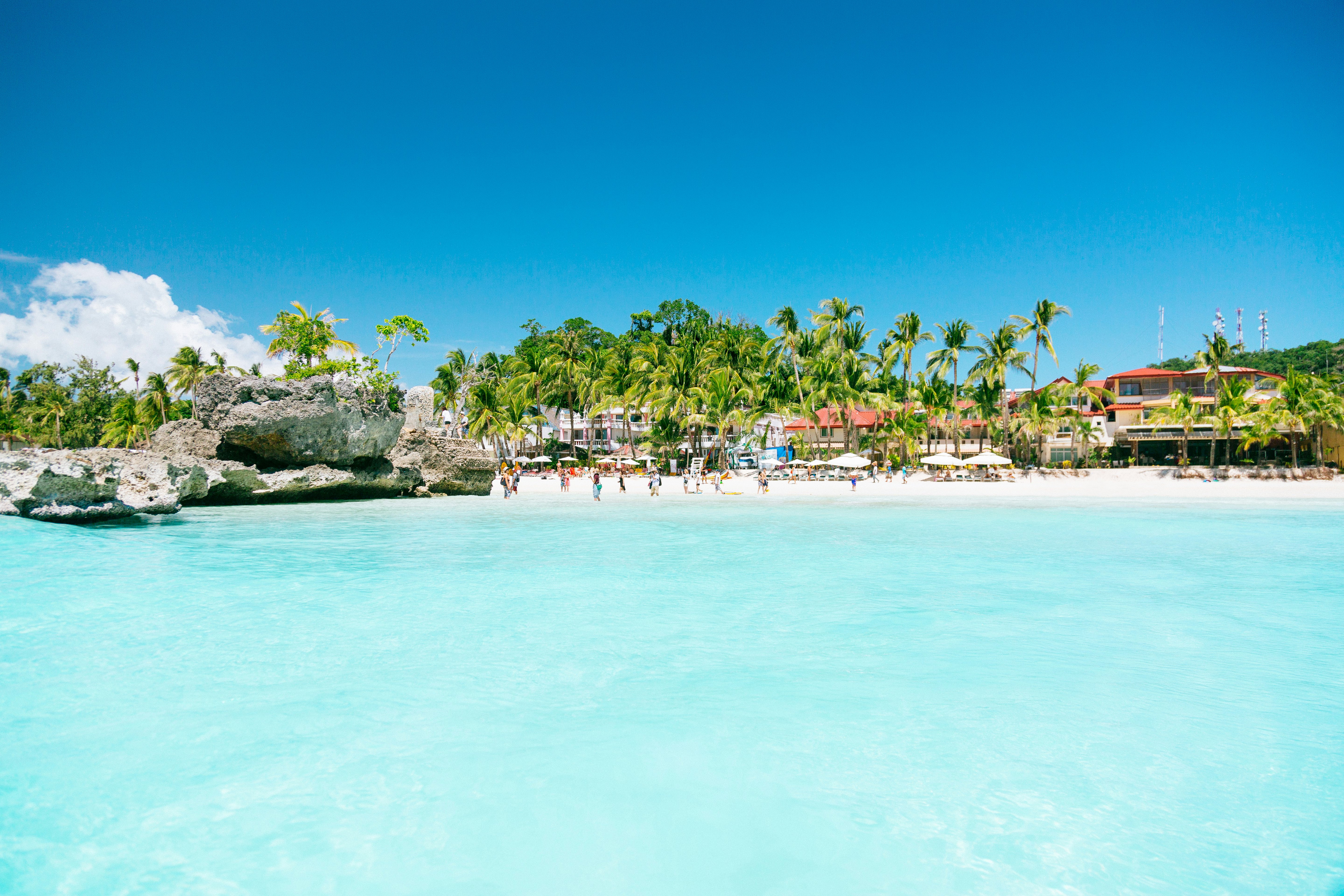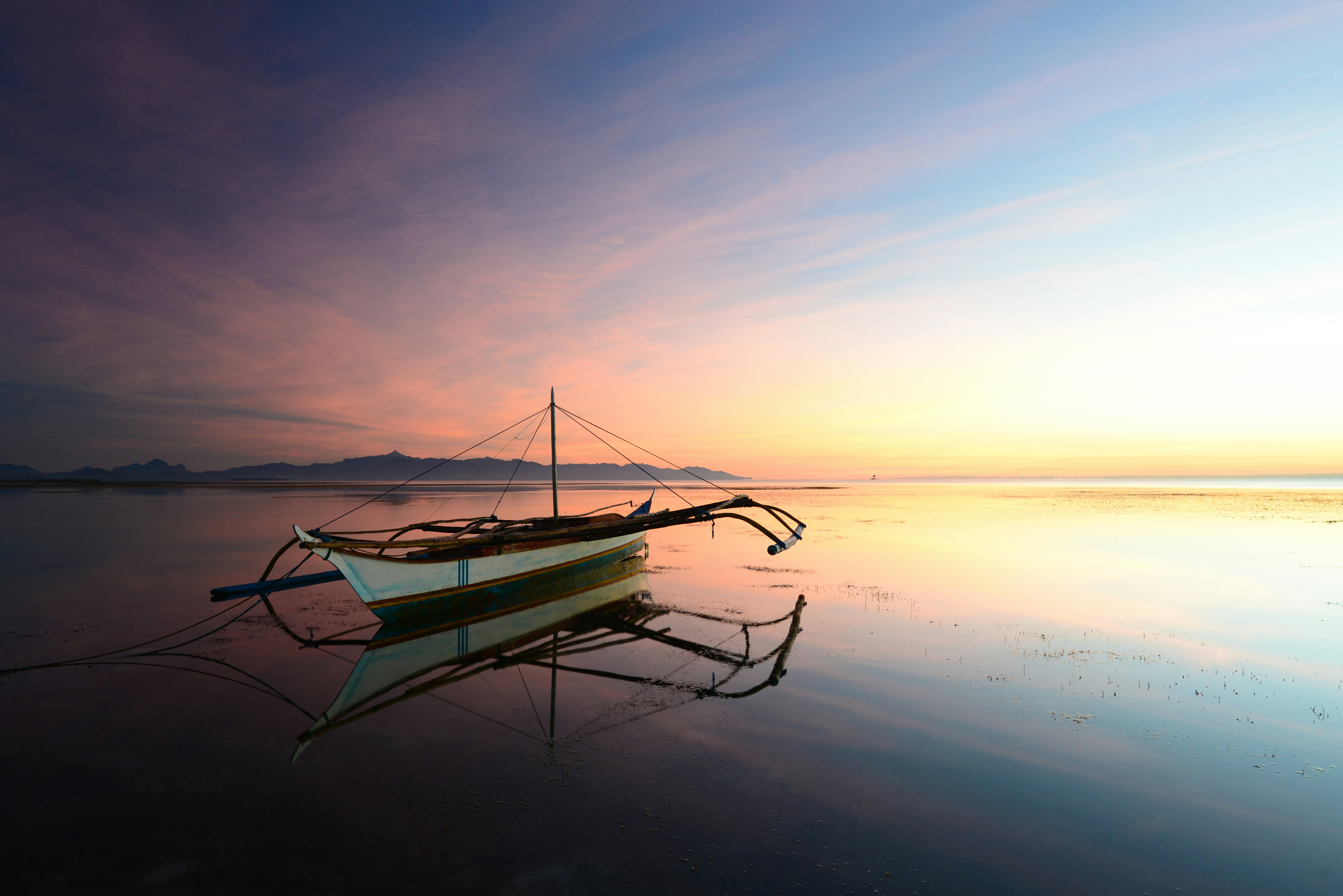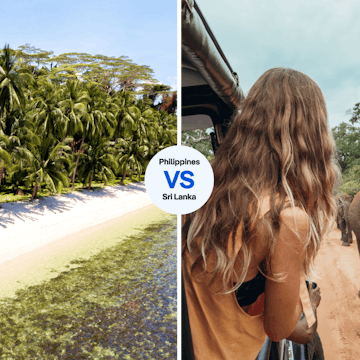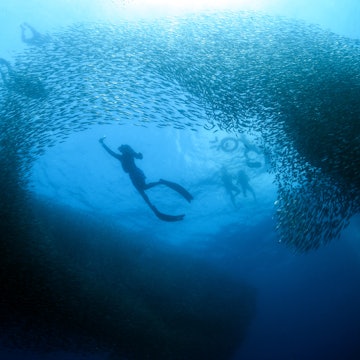

Boracay's famous White beach with Willy's rock on the left. Andrey Danilovich / Getty Images
The Philippines' famed island, Boracay, was closed to the public in April 2018 in an attempt to try and restore the incredible location to its former glory after suffering the effects of overtourism. The picturesque island, previously famous for pristine beaches and a heady party vibe, has reopened with a limit on the daily number of visitors and a set of rules designed to protect the environment. If you want to take the boat less travelled, keep your flippers on and consider these responsible alternatives to Boracay within the island-hopping haven that is the Philippines.

Panglao Island (Visayas)
Main attraction: Beach bars
Also known for: Diving, ecotours
Panglao is one of the few Philippines resort areas that comes close to recreating Boracay’s famous party vibe. Most of the action takes place on Alona Beach along the south coast, a ‘mini-Boracay’ of sorts, where a steady lineup of restaurants and bars flank an enviable ribbon of white sand. It lacks the thumping club scene of Boracay — Alona is more about sipping cocktails or a chilled beer on the sand, accompanied by the strains of live acoustic music. However, stroll up the hill behind the beach and determined revellers will find a few pubs catering to late-night barflies, plus the odd nightclub.

Panglao is also a haven for marine creatures, with superb snorkelling offshore and the famous reefs of Balicasag Island just 45 minutes away by boat. Early morning dolphin-spotting trips are de rigueur – do it responsibly with Pamilacan Island Dolphin & Whale Watching. Linked by a causeway to the much larger island of Bohol, Panglao is handy for visiting the latter’s iconic tarsiers and Chocolate Hills, or for stand-up paddle boarding on the jungle-lined Loboc River and kayaking on the Abatan River.
Sibaltan (Palawan)
Main attraction: Kite surfing
Also known for: Chilling out, island-hopping
Kitesurfing is huge on Boracay, but there are several lesser-known destinations that can give the island a run for its money in the realm of water sports. Prime among those is Sibaltan, a small village on the northeast coast of mainland Palawan, about 40km from the city of El Nido. Sibaltan is administratively a part of El Nido, but lacks the latter’s hordes of tourists. It is decidedly mellow, with just a few resorts scattered along virtually empty beaches.
Like most prime kitesurfing spots in the Philippines, Sibaltan faces east, the perfect position to take advantage of the strong and steady northeast breezes that buffet the country from November to April. A smattering of kitesurfing operations, including El Nido Kiteboarding, have planted flags here. A few clicks north, in the village of San Fernando, boutique beach resort Qi Palawan has a full-service kitesurfing center. For island hoppers, the lonely Linapacan group of islands linger just offshore, offering beaches the equal of anywhere in the universe.
Siquijor (Western Visayas)
Main attraction: White-sand beaches
Also known for: Shamans, snorkelling
No place in the Philippines – indeed, few places in the world – can replicate the striking luminescence of Boracay’s 4km-long flagship White Beach, but for those seeking copious quantities of white sand, the Western Visayan island of Siquijor can come close. Siquijor’s beaches come in all shapes and sizes, but the most striking is Paliton Beach, which faces the sunset in the town of San Juan on the buffalo-head-shaped island’s southwest coast. Just southeast of Paliton is Solangan Beach, where hammocks connect palm trees in front of backpacker-friendly beach resorts like JJ’s Backpackers Village & Cafe. Plus, these beaches have something Boracay lacks: killer snorkelling.
Tear around the island’s 75km ring road by motorbike – the only way to roll – and you’ll encounter one scenic beach after another. In Larena, endless Sandugan Beach is known for epic sunsets and is a great place to hire a sea kayak from one of several low-key resorts. At busy Salangdoong Beach, you can dive into crystal clear turquoise waters from a 12m platform built into the rocks. And Siquijor is not just about beaches. Inland are jungles, caves, waterfalls and witch doctors who for a small fee will treat your injuries with magic potions and spells – it’s not for nothing that Siquijor is called the ‘mystic island’. The island’s spooky reputation makes some locals reluctant to visit, which keeps the crowds down.
San Vicente & Port Barton (Palawan)
Main attraction: Sunsets
Also known for: Waterfalls, snorkelling
With a wide 7km beach of fine alabaster sand (aptly named Long Beach), San Vicente in central Palawan naturally invites comparisons with Boracay and its trophy White Beach. Like Boracay, San Vicente has uninterrupted westward views of the West Philippine Sea, yielding legendary sunsets that seem to linger for hours.
For now the only full-service resort on Long Beach is Club Agutaya, and most development in the area remains south of town in the ultra-chill village of Port Barton. Linked to San Vicente by a brand-new coastal road, the tiny town has become a popular stop for in-the-know backpackers looking to escape civilization. Its beach, backed by pristine jungle, is gorgeous, but its barely discovered coastline is even more stunning. Affordable private-island resorts linger just offshore. Our advice: get here before everyone else does.

Camiguin (Mindanao)
Main attraction: Activities
Also known for: Thresher sharks, small-island vibe
The rugged island of Camiguin doesn't much resemble the breezy little paradise that is Boracay, but both are top-five locations in the Philippines for adrenaline junkies. While Boracay is known for kitesurfing, parasailing, scuba diving, sailing, stand-up paddling, skim-boarding and even golf, Camiguin’s menu of activities is more balanced between terrestrial and aquatic pursuits. Its glorious circumferential road, with jaw-dropping views around every turn, measures 64km and provides access to waterfalls, hot springs and hiking trails that lead right up to the top of smouldering volcanoes.
Underwater, the scuba diving around Camiguin is top-notch. Turtle-laden Mantigue Island is one of the top sites in terms of both visibility and the variety of its marine life, while the sunken cemetery is one of the country’s most unique dive spots. Or ditch the dive gear and learn to free dive with Kurma Freedive & Yoga. White Island, a solitary slick of sand off Camiguin’s northwest coast, is one of the Philippines’ most photographed sites, although it can be tough to dodge the Instagramming crowds (try sunset). Lovely American colonial-era architecture, black-sand beaches and the world’s best lanzones (a sour-sweet tropical fruit) round out the equation.
Still want more? The Philippines is awash with stunning sand, check out this article to read more about what they've got to offer!
Take your Philippines trip with Lonely Planet Journeys
Time to book that trip to Philippines
Lonely Planet Journeys takes you there with fully customizable trips to top destinations – all crafted by our local experts.
























